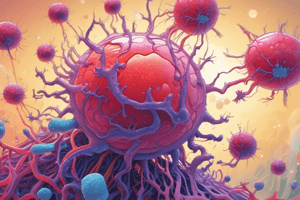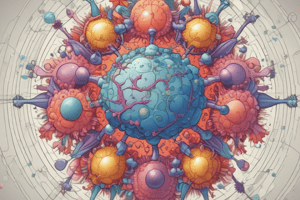Podcast
Questions and Answers
What is the primary function of B cells in the immune system?
What is the primary function of B cells in the immune system?
- Suppress immune responses
- Produce humoral immunity (correct)
- Activate macrophages
- Directly kill infected cells
Where do stem cells develop into T cells?
Where do stem cells develop into T cells?
- Lymph nodes
- Spleen
- Thymus gland (correct)
- Bone marrow
What type of immunity do cytotoxic T cells primarily provide?
What type of immunity do cytotoxic T cells primarily provide?
- Adaptive immunity
- Humoral immunity
- Passive immunity
- Cell-mediated immunity (correct)
What role do Helper T cells play in the immune response?
What role do Helper T cells play in the immune response?
What occurs when a T cell's surface proteins bind to an antigen?
What occurs when a T cell's surface proteins bind to an antigen?
What is the main function of lymph in the lymphatic system?
What is the main function of lymph in the lymphatic system?
Which of the following is NOT a primary lymphatic structure?
Which of the following is NOT a primary lymphatic structure?
What aspect differentiates active immunity from passive immunity?
What aspect differentiates active immunity from passive immunity?
Which lymphatic vessel drains lymph from the right upper extremity?
Which lymphatic vessel drains lymph from the right upper extremity?
What structural feature of lymphatic capillaries allows for one-way movement of lymph?
What structural feature of lymphatic capillaries allows for one-way movement of lymph?
Which type of immunity is formed as a result of exposure to a pathogen?
Which type of immunity is formed as a result of exposure to a pathogen?
B and T cells are crucial for which type of immunity?
B and T cells are crucial for which type of immunity?
What is the largest lymphatic vessel in the body?
What is the largest lymphatic vessel in the body?
What is the primary function of lymph nodes in the lymphatic system?
What is the primary function of lymph nodes in the lymphatic system?
Which of the following describes the thymus?
Which of the following describes the thymus?
Which statement is true regarding lymphatic vessels?
Which statement is true regarding lymphatic vessels?
What happens to the thymus tissue during adulthood?
What happens to the thymus tissue during adulthood?
Where are tonsils located?
Where are tonsils located?
Which lymphoid organ is responsible for producing T lymphocytes?
Which lymphoid organ is responsible for producing T lymphocytes?
What type of tissue primarily composes the thymus?
What type of tissue primarily composes the thymus?
Which statement about the lymphatic drainage of the breast is accurate?
Which statement about the lymphatic drainage of the breast is accurate?
What type of immunity is achieved through vaccination?
What type of immunity is achieved through vaccination?
What role do antibodies play in the immune system?
What role do antibodies play in the immune system?
What is the primary function of complement proteins in the immune response?
What is the primary function of complement proteins in the immune response?
What is the process called when complement proteins are activated?
What is the process called when complement proteins are activated?
In which immunity does protective material developed in another individual’s immune system provide immediate protection?
In which immunity does protective material developed in another individual’s immune system provide immediate protection?
What term describes the immunity that arises from both the use of vaccines and the body’s subsequent immune response?
What term describes the immunity that arises from both the use of vaccines and the body’s subsequent immune response?
What is the primary function of phagocytes in the immune system?
What is the primary function of phagocytes in the immune system?
What is NOT a function of antibodies?
What is NOT a function of antibodies?
In which location does the development of immature B cells primarily occur in adults?
In which location does the development of immature B cells primarily occur in adults?
What triggers the activation of B cells?
What triggers the activation of B cells?
How do cytokines contribute to the immune response?
How do cytokines contribute to the immune response?
What are memory cells primarily responsible for?
What are memory cells primarily responsible for?
Which type of immune cell is primarily responsible for presenting antigens?
Which type of immune cell is primarily responsible for presenting antigens?
Which cells divide to form plasma cells and memory cells upon activation?
Which cells divide to form plasma cells and memory cells upon activation?
What is a primary characteristic of neutrophils?
What is a primary characteristic of neutrophils?
What is the role of plasma cells in the immune response?
What is the role of plasma cells in the immune response?
What is the primary function of the spleen?
What is the primary function of the spleen?
What is the location of the spleen in the human body?
What is the location of the spleen in the human body?
Which type of immunity is described as not requiring prior exposure to an antigen?
Which type of immunity is described as not requiring prior exposure to an antigen?
What is the role of cytokines during the inflammatory response?
What is the role of cytokines during the inflammatory response?
What characterizes specific immunity?
What characterizes specific immunity?
What type of immunity is achieved through exposure to a disease?
What type of immunity is achieved through exposure to a disease?
Which organ is often injured due to abdominal trauma?
Which organ is often injured due to abdominal trauma?
How much blood can the spleen act as a reservoir for?
How much blood can the spleen act as a reservoir for?
Flashcards
What is lymph?
What is lymph?
Fluid circulating throughout the lymphatic system, similar to blood but lacking red blood cells. It collects excess fluid from tissues and returns it to the bloodstream.
Describe lymphatic capillaries
Describe lymphatic capillaries
Tiny, blind-ended tubes that collect interstitial fluid, forming the beginning of the lymphatic system.
What are lymphatic vessels?
What are lymphatic vessels?
Larger vessels that carry lymph from the lymphatic capillaries towards the bloodstream. They are part of the lymphatic system.
Describe the right lymphatic duct
Describe the right lymphatic duct
Signup and view all the flashcards
What is the thoracic duct?
What is the thoracic duct?
Signup and view all the flashcards
What is the role of the lymphatic system?
What is the role of the lymphatic system?
Signup and view all the flashcards
Define nonspecific immunity
Define nonspecific immunity
Signup and view all the flashcards
What is specific immunity?
What is specific immunity?
Signup and view all the flashcards
Lymphatic System
Lymphatic System
Signup and view all the flashcards
Lymph Nodes
Lymph Nodes
Signup and view all the flashcards
Lymph
Lymph
Signup and view all the flashcards
Lymphoid Tissue
Lymphoid Tissue
Signup and view all the flashcards
Thymus
Thymus
Signup and view all the flashcards
Tonsils
Tonsils
Signup and view all the flashcards
T Lymphocytes (T Cells)
T Lymphocytes (T Cells)
Signup and view all the flashcards
Thymosins
Thymosins
Signup and view all the flashcards
What is the spleen?
What is the spleen?
Signup and view all the flashcards
What is a splenectomy?
What is a splenectomy?
Signup and view all the flashcards
What is nonspecific immunity?
What is nonspecific immunity?
Signup and view all the flashcards
Describe the inflammatory response.
Describe the inflammatory response.
Signup and view all the flashcards
What is natural immunity?
What is natural immunity?
Signup and view all the flashcards
What is active natural immunity?
What is active natural immunity?
Signup and view all the flashcards
What is passive natural immunity?
What is passive natural immunity?
Signup and view all the flashcards
What are phagocytes?
What are phagocytes?
Signup and view all the flashcards
What are neutrophils?
What are neutrophils?
Signup and view all the flashcards
What are monocytes?
What are monocytes?
Signup and view all the flashcards
What are dendritic cells?
What are dendritic cells?
Signup and view all the flashcards
What are lymphocytes?
What are lymphocytes?
Signup and view all the flashcards
What is the second stage of B-cell development?
What is the second stage of B-cell development?
Signup and view all the flashcards
What are plasma cells?
What are plasma cells?
Signup and view all the flashcards
What are memory cells?
What are memory cells?
Signup and view all the flashcards
What is artificial active immunity?
What is artificial active immunity?
Signup and view all the flashcards
What is artificial passive immunity?
What is artificial passive immunity?
Signup and view all the flashcards
What are cytokines?
What are cytokines?
Signup and view all the flashcards
What are antibodies?
What are antibodies?
Signup and view all the flashcards
What are complement proteins?
What are complement proteins?
Signup and view all the flashcards
What is the complement cascade?
What is the complement cascade?
Signup and view all the flashcards
How do complement proteins cause cell lysis?
How do complement proteins cause cell lysis?
Signup and view all the flashcards
What is the function of B cells?
What is the function of B cells?
Signup and view all the flashcards
What is the role of T cells in the immune system?
What is the role of T cells in the immune system?
Signup and view all the flashcards
What is the function of cytotoxic T cells?
What is the function of cytotoxic T cells?
Signup and view all the flashcards
What is the role of helper T cells?
What is the role of helper T cells?
Signup and view all the flashcards
What is the function of regulatory T cells?
What is the function of regulatory T cells?
Signup and view all the flashcards
Study Notes
Lymphatic System and Immunity
- The lymphatic system's role is to carry protein molecules and other substances back to the blood.
- Lymphatic capillaries are tiny, blind-ended tubes found in tissue spaces.
- Lymph only flows in one direction through lymphatic capillaries; these capillaries are microscopic in size, composed of a single layer of simple squamous epithelium, and have porous walls between the adjacent cells.
- The right lymphatic duct drains lymph from the right upper extremity, right side of head, neck, and upper torso.
- The thoracic duct, the largest lymphatic vessel, drains lymph from about three-fourths of the body. It has an enlarged pouch along its course, called the cisterna chyli.
- Lymph nodes are located in clusters along lymphatic vessels and filter lymph.
- Lymph nodes are sites of biological filtration; lymph flows through lymph nodes via multiple afferent lymphatic vessels before being drained by a single efferent lymph vessel.
- The breast has an extensive lymphatic drainage network.
- The thymus is a small lymphoid tissue organ situated within the mediastinum. It weighs about 35-40 grams.
- The thymus plays a crucial role in immunity. It produces T lymphocytes (T cells) and secretes thymosins, hormones that guide T cell development.
- During adulthood, thymus tissue is gradually replaced by fatty and connective tissues, a process known as involution.
- The tonsils are lymphoid tissues found around the openings of the mouth and throat. They comprise three masses: palatine tonsils, pharyngeal tonsils (adenoids), and lingual tonsils.
- The tonsils are susceptible to chronic infections; swollen pharyngeal tonsils may impede breathing.
- The spleen is the body's largest lymphoid organ. It is located in the upper left quadrant of the abdomen, adjacent to the stomach.
- The spleen plays an important role in removing bacteria and old red blood cells (RBCs) through phagocytosis.
- The spleen also serves as a reservoir for blood (approx 500 mL).
- A damaged spleen may require removal, a procedure called a splenectomy.
Immune System
- The immune system protects the body from pathogenic bacteria, foreign tissue cells, and cancerous cells.
- Nonspecific immunity, also known as innate immunity, is an initial defense mechanism often triggered in response to antigens, and does not require prior exposure.
- Inflammatory response is part of the nonspecific immunity and involves the release of cytokines. This attracts immune cells to the injury site and raises local blood flow and vascular permeability.
- Specific immunity, or adaptive immunity, involves the body's ability to recognize, respond to, and remember harmful substances like bacteria. It may require prior exposure.
- Active immunity can be acquired through exposure to active disease, or through vaccines.
- Passive immunity can be acquired via pregnancy (mother to fetus) or through breastfeeding (mother to child).
Immune System Molecules
- Cytokines are chemicals released by cells that guide innate immunity.
- Antibodies are protein compounds with specific binding sites that attach to antigens (foreign substances).
- Antibodies combine with antigens, forming antigen-antibody complexes, which are part of humoral immunity or antibody-mediated immunity.
- Antigen-antibody complexes neutralize toxins, clump enemy cells, promote phagocytosis, and activate complement proteins.
Immune System Cells
- Phagocytes ingest and destroy foreign cells through phagocytosis.
- Neutrophils are short-lived phagocytic cells.
- Monocytes mature into macrophages that migrate to tissues.
- Dendritic cells are often found at external surfaces to act as antigen-presenting cells.
- Macrophages and dendritic cells are antigen-presenting cells (APCs) and display ingested antigens on their surfaces to activate specific immune cells.
- Lymphocytes are the most abundant immune cells, and their development includes both B cells and T cells.
B-Cell development
- B cells mature initially in the liver and bone marrow.
- B cells develop in two major stages: immature and mature
- Mature B cells migrate to lymph nodes, liver, and spleen.
- Upon exposure to antigens, B cells become activated B cells. These cells divide to form clones of cells resulting in both plasma cells and memory cells.
- Plasma cells produce antibodies that circulate through the blood and produce humoral immunity.
T-Cell development
- T cells develop in the thymus gland before and after birth.
- T cell maturation occurs in two stages: immature and mature cells.
- Mature T cells migrate chiefly to lymph nodes.
- Upon exposure to antigens, matured T cells become activated T cells. These differentiate into cytotoxic and helper T-cells.
- Cytotoxic T cells kill infected or tumor cells by releasing a poison. Helper T cells release molecules to attract or activate macrophages, and encourage B cell-mediated immunity to produce antibodies.
- Regulatory T cells suppress immune responses.
Studying That Suits You
Use AI to generate personalized quizzes and flashcards to suit your learning preferences.




